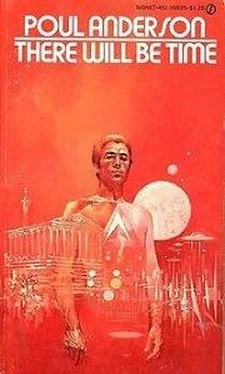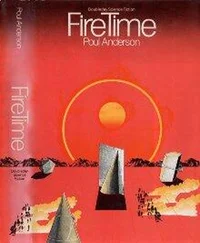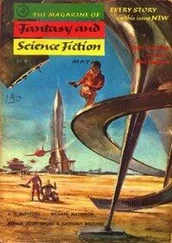Poul Anderson - There Will Be Time
Здесь есть возможность читать онлайн «Poul Anderson - There Will Be Time» весь текст электронной книги совершенно бесплатно (целиком полную версию без сокращений). В некоторых случаях можно слушать аудио, скачать через торрент в формате fb2 и присутствует краткое содержание. Год выпуска: 1972, Издательство: Doubleday, Жанр: Фантастика и фэнтези, на английском языке. Описание произведения, (предисловие) а так же отзывы посетителей доступны на портале библиотеки ЛибКат.
- Название:There Will Be Time
- Автор:
- Издательство:Doubleday
- Жанр:
- Год:1972
- ISBN:нет данных
- Рейтинг книги:5 / 5. Голосов: 1
-
Избранное:Добавить в избранное
- Отзывы:
-
Ваша оценка:
- 100
- 1
- 2
- 3
- 4
- 5
There Will Be Time: краткое содержание, описание и аннотация
Предлагаем к чтению аннотацию, описание, краткое содержание или предисловие (зависит от того, что написал сам автор книги «There Will Be Time»). Если вы не нашли необходимую информацию о книге — напишите в комментариях, мы постараемся отыскать её.
Nominated for Hugo Award for Best Novel in 1973.
There Will Be Time — читать онлайн бесплатно полную книгу (весь текст) целиком
Ниже представлен текст книги, разбитый по страницам. Система сохранения места последней прочитанной страницы, позволяет с удобством читать онлайн бесплатно книгу «There Will Be Time», без необходимости каждый раз заново искать на чём Вы остановились. Поставьте закладку, и сможете в любой момент перейти на страницу, на которой закончили чтение.
Интервал:
Закладка:
He felt guilty about lying to his friends. But it had to be. After all, his objective was to save them.
Xenia’s voice was somewhat high and thin, but whenever he heard or remembered it, Havig would think of songbirds. Thus had it been since first she overcame her timidity and laughed in his presence. From then on, she chattered with him to the limit her parents allowed, or more when they weren’t looking.
She was reed-slender. He had never seen any human who moved with more gracefulness; and when decorum was not required, her feet danced. Her hair was a midnight mass which, piled on her head, seemed as if it ought to bend the delicate neck. Her skin was pale and clear; her face was oval, tilt-nosed, its lips always a little parted. The eyes dominated that countenance, enormous, heavy-lashed, luminous black. Those eyes may be seen elsewhere, in a Ravenna mosaic, upon Empress Theodora the Great; they may never be forgotten.
It was a strange thing to meet her at intervals of months which for Havig were hours or days. Each time, she was so dizzyingly grown. In awe he felt a sense of that measureless river which he could swim but on which she could only be carried from darkness to darkness.
The house was built around a courtyard where flowers and oranges grew and a fountain played. Doukas proudly showed Havig his latest acquisition: on a pedestal in one corner, a bust of Constantine who made Rome Christian and for whom New Rome was named. “From the life, I feel sure,” he said. “By then the art of portrayal was losing its former mastery. Nevertheless, observe his imperiously tight-held mouth—”
Nine-year-old Xenia giggled. “What is it, dear?” her father asked.
“Nothing, really,” she said, but couldn’t stop giggling.
“No, do tell us. I shan’t be angry.”
“He … he … he wants to make a very important speech, and he has gas!”
“By Bacchus,” Havig exclaimed, “she’s right!”
Doukas struggled a moment before he gave up and joined the fun.
“Oh, please, will you not come to church with us, Hauk?” she begged. “You don’t know how lovely it is, when the song and incense and candle flames rise up to Christ Pantocrator.” She was eleven and overflowing with God.
“I’m sorry,” Havig said. “You know I am, am Catholic.”
“The saints won’t mind. I asked Father and Mother, and they won’t mind either. We can say you’re a Russian, if we need to. I’ll show you how to act.” She tugged his hand. “Do come!”
He yielded, not sure whether she hoped to convert him or merely wanted to share something glorious with her honorary uncle.
“But it’s too wonderful!” She burst into tears and hugged her thirteenth birthday present to her before holding it out. “Father, Mother, see what Hauk gave me! This book, the p-p-plays of Euripides — all of them — for me!”
When she was gone to change clothes for a modest festival dinner, Doukas said: “That was a royal gift. Not only the cost of having the copy made and binding it as a codex. The thought.”
“I knew she loves the ancients as much as you do,” the traveler answered.
“Forgive me,” Anna the mother said. “But at her age … may Euripides not be, well, stern reading?”
“These are stern times,” Havig replied, and could no longer feign joy. “A tragic line may hearten her to meet fate.” He turned to the goldsmith. “Doukas, I tell you again, I swear to you, I know through my connections that the Venetians at this very moment are negotiating with other Frankish lords—”
“You have said that.” The goldsmith nodded. His hair and beard were nearly white.
“It’s not too late to move you and your family to safety. I’ll help.”
“Where is safety better than these walls, which no invader has ever breached? Or where, if I break up my shop, where is safety from pauperdom and hunger? What would my apprentices and servants do? They can’t move. No, my good old friend, prudence and duty alike tells us we must remain here and trust in God.” Doukas uttered a small sad chuckle. “‘Old,’ did I say? You never seem to change. Well, you’re in your prime, of course.”
Havig swallowed. “I don’t think I’ll be back in Constantinople for some while. My employers, under present circumstances — Be careful. Keep unnoticeable, hide your wealth, stay off the streets whenever you can and always at night. I know the Franks.”
“Well, I, I’ll bear your advice in mind, Hank, if — But you go too far. This is New Rome.”
Anna touched the arms of both. Her smile was uncertain. “Now that’s enough politics, you men,” she said. “Take off those long faces. We’re making merry on Xenia’s day. Have you forgotten?”
Time-skipping in an alley across the street, Havig checked the period of the first Latin occupation. Nothing terrible seemed to happen. The house drew back into itself and waited.
He went pastward to a happier year, took a night’s lodging, forced himself to eat a hearty supper and get a lot of sleep. Next morning he omitted breakfast: a good idea when you may soon be in combat.
He jumped ahead, to the twelfth of April, 1204.
He could be no more than an observer through the days and nights of the sack. His orders were explicit and made sense:
“If you can possibly avoid it, stay out of danger. Under no conditions mingle, or try to influence events. Absolutely never, and this is under penalties, never enter a building which is a scene of action. We want your report, and for that we need you alive.”
Fire leaped and roared. Smoke drifted bitter. People huddled like rats indoors, or fled like rats outside, and some escaped but thousands were ridden down, shot down, chopped down, beaten, stomped, tortured, robbed, raped, by yelling sooty sweaty blood-spattered men whose fleas hopped about on silks and altar cloths they had flung across their shoulders. Corpses gaped in the gutters, which ran red till they clotted. Many of the bodies were very small. Mothers crept about shrieking for children, children for mothers; most fathers lay dead. Orthodox priests in their churches were kept in pain until they revealed where the treasury was hidden; usually there was none, in which case it was great sport to soak their beards in oil and set these alight. Women, girls, nuns of any age lay mumbling or whimpering after a row of men had violated them. Humiliations more ingenious might be contrived.
A drunken harlot sat on the patriarch’s throne in Hagia Sophia, while dice games for plunder were played on the altars. The bronze horses of the Hippodrome were carted off to Venice’s Cathedral of St. Mark; artwork, jewelry, sacred objects would be scattered across a continent; but at least these things were preserved. More was melted down or torn apart for the precious metals and stones, or smashed or burned for amusement. So perished much classical art, and nearly all classical writing, which Constantinople had kept safe until these days. It is not true that the Turks of 1453 were responsible. The Crusaders were there before them.
Afterward came the great silence, broken by furtive crying, and the stench, and the sickness, and the hunger.
In this wise, at the beginning of that thirteenth century which Catholic apologists call the apogee of civilization, did Western Christendom destroy its Eastern flank. A century and a half later, having devoured Mia Minor, the Turks entered Europe.
Havig time-skipped.
He would return to a safe date, seek out one of his chosen sites, and advance through the whole period of the sack, flickering in and out of normal time, until he knew what was to happen there. When he saw a Frankish band enter a place, he focused more sharply. In most cases they staggered out after a while, sated with death and torment, kicking prisoners who carried away their spoils. Those buildings he wrote off. You couldn’t change the past or future, you could merely discover what parts were your own.
Читать дальшеИнтервал:
Закладка:
Похожие книги на «There Will Be Time»
Представляем Вашему вниманию похожие книги на «There Will Be Time» списком для выбора. Мы отобрали схожую по названию и смыслу литературу в надежде предоставить читателям больше вариантов отыскать новые, интересные, ещё непрочитанные произведения.
Обсуждение, отзывы о книге «There Will Be Time» и просто собственные мнения читателей. Оставьте ваши комментарии, напишите, что Вы думаете о произведении, его смысле или главных героях. Укажите что конкретно понравилось, а что нет, и почему Вы так считаете.












